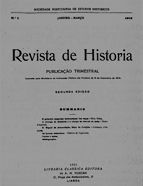

................................
The rationalist conception of history, rooted in the ideals of the French Revolution, was regarded as obsolete. This conception " sought to construct a moral framework and social organisation based on the principles of science " , relying on the belief in an objective, impersonal, and timeless truth. In contrast, it was deemed necessary to apply to the study of society “a dynamic and temporal criterion, a psychological method that considered final causes, aiming primarily to explain rather than to evaluate” ( op. cit. , pp. 216–217). Thus, b y rejecting the objective and timeless knowledge advocated by positivist historiography—a hegemonic perspective in the official culture, including scientific and educational institutions—a methodology was proposed that emphasised the relationship between past and present, thereby enabling an understanding and explanation of the evolution of historical processes (influenced by H. Spencer). History was afforded the status of a science distinct from the natural sciences, highlighting the historian's role in the process (the subjectivity of historical knowledge) and, above all, the methodology employed. This methodological approach marked a departure from the prevailing historiographical tradition in Portugal. By expanding the documentary base, historical studies were assumed to increasingly rely on interdisciplinarity—drawing on palaeography, archaeology, epigraphy, numismatics, geography, and other fields—at least in their conception and application. History was positioned as a synthesising discipline, in line with the Revue de Synthèse Historique (1st Series, 1900–1913; 2nd Series, 1913–1930).
The establishment of the SPEH also reflected the influence of German historiography in Portugal, introduced to the country by Heinrich Schaeffer and Alexandre Herculano. Nationalist-oriented historiography had evolved into new forms since the early nineteenth century, notably through the reforms of Baron von Stein and the establishment of the Historical Society in Germany. The emergence of historical societies was one response to the nationalist concerns prevalent in the second half of the nineteenth century. In Portugal, the National Society of History, later the Portuguese Society of Historical Studies, promoted the study of traditions and national history, aligning with the broader European nationalist movement. Similar examples can be found in Southern Europe, such as the Institut d’Estudis Catalans , established in 1907 in Barcelona, or the Centre d’Estudis Catalans , founded in 1910 within the Junta para la Ampliación de Estudios e Investigación . In Italy, the Istituto Storico Italiano was founded in 1883 in Rome.
This work is financed by national funds through FCT - Foundation for Science and Technology, I.P, in the scope of the projects UIDB/04311/2020 and UIDP/04311/2020.
